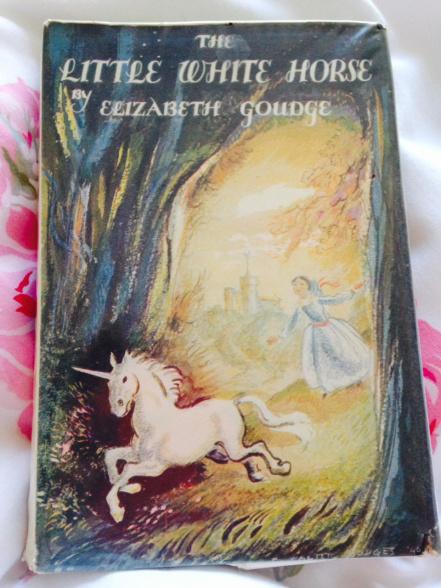
After reading and thoroughly enjoying The Runaways, recently brought back into publication as part of Hesperus Press’ lovely Hesperus Minor collection, I was determined to find and read more of Elizabeth Goudge’s work. Some online research revealed that many fans of Goudge cite The Little White Horse as their favourite, and so I thought that would probably be a good place to start on my voyage through her extensive list of novels. Serendipitously, I managed to snap up a lovely original hardcover online for a bargain price, and when it arrived, one look at the adorable dustjacket told me that I was in for a big dollop of escapism with a generous side of charm. As I opened the cover, I put aside my reason and my scepticism and allowed myself to approach the story with the unquestioning attitude of a child, otherwise the magic would be utterly ruined. Consider yourself duly warned; this is not a novel to be approached with a rational mind!
Maria Merryweather, her guardian Miss Heliotrope and her dog Wiggins arrive at Moonacre Manor, their new home in the middle of the Devonshire countryside, on a moonlit night. Maria has been orphaned, and with no money due to her late father’s spendthrift ways, she has had to leave behind her luxurious London townhouse and come to live with Sir Benjamin, her only surviving relative. Maria, a stubborn, pampered yet good hearted little thing, is not convinced about her move to the country, but upon arrival at the mysterious, beautiful Moonacre, she soon changes her mind. Sir Benjamin proves to be kind and gentle, and his home is more than comfortable. Maria is shown to her bedroom in the tower of the Manor, and is instantly overcome with emotion at how fitting it is to her personality; its ceiling is covered in moons and stars, and the silvery furniture and beautiful bedspread speak of delicacy, refinement and beauty; everything Maria values. Maria and Miss Heliotrope are made instantly at home, but very soon it becomes clear that Moonacre and its village, Silverydew, are very far from ordinary, and are going to change their lives in ways they could never have imagined.
Their first day at Moonacre reveals many a mystery; Maria wakes up to find clothes laid out for her, and fresh flowers, and delicious food is presented at mealtimes. However, there are no servants at Moonacre other than the ancient coachman, Digweed. Who is providing all of these things? The animals at Moonacre, such as Sir Benjamin’s huge dog, Wrolf, appear to have lived for generations, and Maria is convinced that she has seen a white horse that apparently doesn’t exist running in the garden. The house is decorated with feminine touches, but no woman has lived there for 20 years and no one will tell Maria anything about the last occupant of her room. The little boy who Maria used to play with in her London garden appears again at Moonacre, and instead of being the imaginary friend Miss Heliotrope always said he was, he is perfectly real. Moonacre appears to be a place where the impossible becomes possible, and where all is not as it seems. As idyllic as it all looks, there is much sadness and danger at Moonacre, with the community threatened by the malevolent ‘Black Men’ of the woods and the Manor haunted by the mystery of its missing Moon Princess. To bring about peace and harmony once more, Maria will have to find a courage she never knew she had, and take all the help she can get, because it will not be an easy journey…
Every page of his novel is a delight. It is a story very much of its time: goodness and evil, religion and sin and manners and morality are its watchwords, and its purpose is to educate as much as it is to entertain. However, this doesn’t mean that it fails to enchant; far from it. Moonacre is filled with delightful characters, all of whom come to life on the pages and create a vivid, fantastical world where everything is beautiful and all’s well that ends well. Adults can easily see the connections between characters and events long before they are revealed, but I can imagine that if I had read this as a child, I would have been shocked and surprised by most of the coincidental happenings. It is a story, in its essence, about redemption and hope; at Moonacre, no sin is too great to overcome, and no-one, no matter how wicked their ways, cannot change. It is simplistic, even idealistic, but we all need a little idealism in our lives now and again. The Little White Horse is a marvelous vision of a world where courage and kindness can overcome all ills, and while at times it may be a little saccharine and twee, I loved every minute of it. If you need to escape for a little while, this will be just the ticket!
